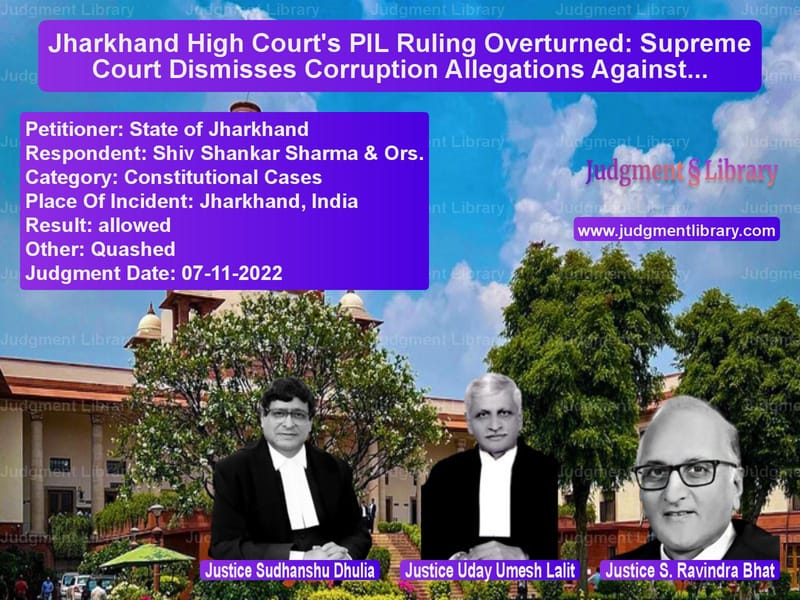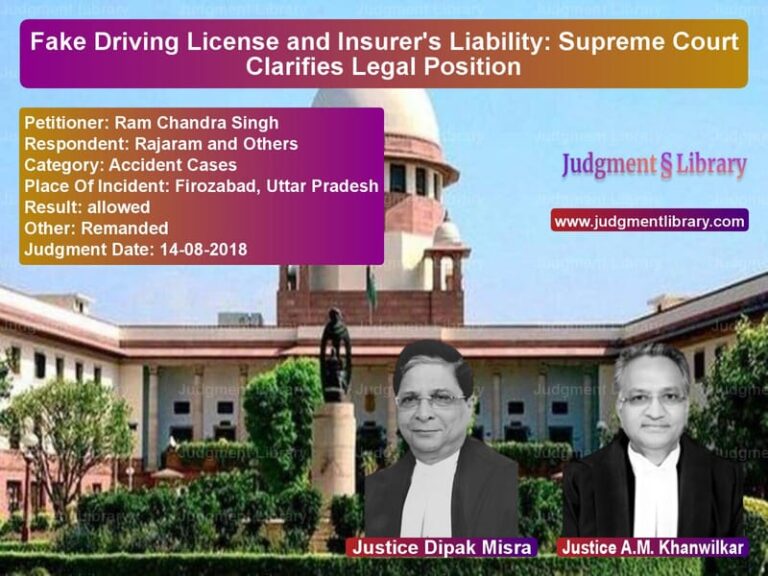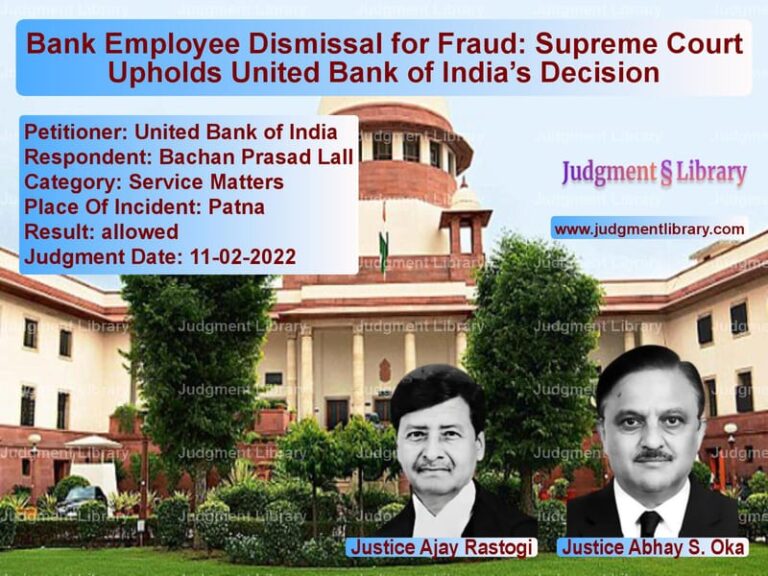Jharkhand High Court’s PIL Ruling Overturned: Supreme Court Dismisses Corruption Allegations Against Chief Minister
The Supreme Court of India has delivered a critical judgment in the case of State of Jharkhand vs. Shiv Shankar Sharma & Ors., which addressed the maintainability of two Public Interest Litigations (PILs) filed against the Chief Minister of Jharkhand, Hemant Soren. These PILs alleged corruption, illegal land acquisitions, and misuse of office by the Chief Minister. However, the Supreme Court overturned the Jharkhand High Court’s ruling, stating that the PILs lacked substantive evidence and were filed with an oblique motive.
The ruling reaffirms the principle that courts should not entertain vague allegations in PILs without clear proof and that due process must be followed before making accusations against high-ranking public officials.
Background of the Case
The controversy began when two PILs were filed by Shiv Shankar Sharma before the Jharkhand High Court. These PILs alleged large-scale corruption, money laundering, and illegal acquisition of land by Chief Minister Hemant Soren and his associates. The primary relief sought in the petitions was a directive for the Central Bureau of Investigation (CBI) and the Enforcement Directorate (ED) to investigate the matter.
The State of Jharkhand, through the Resident Commissioner, challenged the maintainability of these PILs before the Supreme Court, arguing that they were politically motivated and lacked concrete evidence.
Arguments by the Parties
Petitioner (State of Jharkhand)
- The state argued that the PILs were filed with an ulterior motive to discredit the government rather than for any genuine public interest.
- It contended that the Jharkhand High Court had overlooked procedural requirements in admitting the PILs.
- Emphasized that the petitioners had not approached investigative agencies before filing the PILs, violating the fundamental requirement for invoking the writ jurisdiction of the court.
Respondent (Shiv Shankar Sharma & Others)
- Claimed that large sums of money had been transferred through shell companies allegedly controlled by Hemant Soren and his family.
- Argued that the state government’s inaction justified judicial intervention through a PIL.
- Alleged that the Chief Minister had misused his office for personal enrichment, including acquiring mining leases in violation of constitutional and legal provisions.
Observations by the Supreme Court
The Supreme Court, in its ruling, made the following key observations:
- The petitioners had failed to provide substantial evidence to support their allegations.
- Vague claims of corruption, without any supporting material, cannot be the basis for judicial intervention.
- PILs should not be used as political tools to settle scores or target individuals without due process.
- The Jharkhand High Court had erred in entertaining the PILs despite their procedural shortcomings.
The Court quoted:
“A writ court is not an appropriate forum for seeking an initiation of such an investigation. A constitutional court cannot be used as a platform for fishing and roving inquiries.”
Judicial Precedents Cited
The Supreme Court referred to several previous rulings to support its decision:
- Kunga Nima Lepcha vs. State of Sikkim: The Court held that investigations should be conducted by statutory authorities and not initiated through PILs.
- Ashok Kumar Pandey vs. State of West Bengal: The ruling emphasized that PILs should not be used for political vendettas or personal grievances.
- Balwant Singh Chaufal vs. State of Uttaranchal: The Court established guidelines to prevent the misuse of PILs and ensure they serve genuine public interest.
Final Verdict
The Supreme Court allowed the appeals filed by the State of Jharkhand and ruled as follows:
- The PILs were dismissed as they lacked substantial evidence.
- The Jharkhand High Court’s order was set aside.
- Future PILs must comply with procedural requirements and not be filed with oblique motives.
Impact of the Ruling
This judgment serves as a strong precedent in ensuring that PILs are not misused for political purposes. Key takeaways include:
- Stricter Scrutiny of PILs: Courts will now be more cautious in admitting PILs alleging corruption against public officials.
- Protection Against Unsubstantiated Claims: The ruling safeguards public officials from baseless accusations without due process.
- Reinforcement of Judicial Discipline: The judgment reaffirms that PILs must be supported by credible evidence and procedural compliance.
Conclusion
The Supreme Court’s decision in this case reaffirms the fundamental principle that judicial intervention should be based on solid evidence, not speculation. By dismissing the PILs, the Court has sent a clear message that political battles should not be fought in courts under the guise of public interest litigation.
This ruling upholds the integrity of the judicial system and ensures that only genuine cases of public interest reach the courts.
Petitioner Name: State of Jharkhand.Respondent Name: Shiv Shankar Sharma & Ors..Judgment By: Justice Sudhanshu Dhulia, Justice Uday Umesh Lalit, Justice S. Ravindra Bhat.Place Of Incident: Jharkhand, India.Judgment Date: 07-11-2022.
Don’t miss out on the full details! Download the complete judgment in PDF format below and gain valuable insights instantly!
Download Judgment: state-of-jharkhand-vs-shiv-shankar-sharma-supreme-court-of-india-judgment-dated-07-11-2022.pdf
Directly Download Judgment: Directly download this Judgment
See all petitions in Public Interest Litigation
See all petitions in Fundamental Rights
See all petitions in Legislative Powers
See all petitions in Constitution Interpretation
See all petitions in Judgment by Sudhanshu Dhulia
See all petitions in Judgment by Uday Umesh Lalit
See all petitions in Judgment by S Ravindra Bhat
See all petitions in allowed
See all petitions in Quashed
See all petitions in supreme court of India judgments November 2022
See all petitions in 2022 judgments
See all posts in Constitutional Cases Category
See all allowed petitions in Constitutional Cases Category
See all Dismissed petitions in Constitutional Cases Category
See all partially allowed petitions in Constitutional Cases Category







